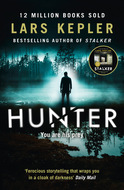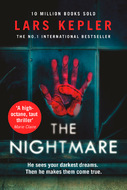Kitap dosya olarak indirilemez ancak uygulamamız üzerinden veya online olarak web sitemizden okunabilir.
Kitabı oku: «The Sandman»
THE SANDMAN
LARS KEPLER
Translated from the Swedish by Neil Smith

Copyright
HarperCollinsPublishers
1 London Bridge Street
London SE1 9GF
First published in Great Britain by HarperCollinsPublishers 2014
Copyright © Lars Kepler 2012
Translation copyright © Neil Smith 2014
All rights reserved
Originally published in 2012 by Albert Bonniers Förlag, Sweden, as Sandmannen
Lars Kepler asserts the moral right to be identified as the author of this work
Cover design © Claire Ward HarperCollinsPublishers Ltd 2018
Cover photography © Henry Steadman/Arcangel Images
This is entirely a work of fiction. Any references to real people, living or dead, real events, businesses, organizations and localities are intended only to give the fiction a sense of reality and authenticity. All names, characters and incidents are either the product of the author’s imagination or are used fictitiously, and their resemblance, if any, to real-life counterparts is entirely coincidental.
A catalogue record for this book is available from the British Library
All rights reserved under International and Pan-American Copyright Conventions. By payment of the required fees, you have been granted the non-exclusive, non-transferable right to access and read the text of this e-book on-screen. No part of this text may be reproduced, transmitted, down-loaded, decompiled, reverse engineered, or stored in or introduced into any information storage and retrieval system, in any form or by any means, whether electronic or mechanical, now known or hereinafter invented, without the express written permission of HarperCollins e-books
Source ISBN: 9780008241841
Ebook Edition © APRIL 2018 ISBN: 9780007467808
Version: 2019-03-01
International Praise for Lars Kepler:
‘A terrifying and original read’
Sun
‘A rollercoaster ride of a thriller full of striking twists’
Mail on Sunday
‘Sensational’
Lee Child
‘An international book written for an international audience’
Huffington Post
‘Ferocious, visceral storytelling that wraps you in a cloak of darkness. It’s stunning’
Daily Mail
‘One of the best – if not the best – Scandinavian crime thrillers I’ve read’
Sam Baker, Red
‘A creepy and compulsive crime thriller’
Mo Hayder
‘Intelligent, original and chilling’
Simon Beckett
‘Mesmerizing … a bad dream that takes hold and won’t let go’
Wall Street Journal
‘One of the most hair-raising crime novels published this year’
Sunday Times
‘Grips you round the throat until the final twist’
Woman & Home
‘A serious, disturbing, highly readable novel that is finally a meditation on evil’
Washington Post
‘A genuine chiller … deeply scarifying stuff’
Independent
‘Far above your average thriller … you’ll be terrified’
Evening Standard
‘A pulse-pounding debut that is already a native smash’
Financial Times
‘The cracking pace and absorbing story mean it cannot be missed’
Courier Mail
‘Utterly outstanding’
Morgenavisen Jyllands-Posten , Denmark
‘Disturbing, dark and twisted’
Easy Living
‘Creepy and addictive’
She
‘Brilliant, well written and very satisfying. A superb thriller’
De Telegraaf , Netherlands
Contents
Cover
Title Page
Copyright
International Praise for Lars Kepler
Chapter 1
Chapter 2
Chapter 3
Chapter 4
Chapter 5
Chapter 6
Chapter 7
Chapter 8
Chapter 9
Chapter 10
Chapter 11
Chapter 12
Chapter 13
Chapter 14
Chapter 15
Chapter 16
Chapter 17
Chapter 18
Chapter 19
Chapter 20
Chapter 21
Chapter 22
Chapter 23
Chapter 24
Chapter 25
Chapter 26
Chapter 27
Chapter 28
Chapter 29
Chapter 30
Chapter 31
Chapter 32
Chapter 33
Chapter 34
Chapter 35
Chapter 36
Chapter 37
Chapter 38
Chapter 39
Chapter 40
Chapter 41
Chapter 42
Chapter 43
Chapter 44
Chapter 45
Chapter 46
Chapter 47
Chapter 48
Chapter 49
Chapter 50
Chapter 51
Chapter 52
Chapter 53
Chapter 54
Chapter 55
Chapter 56
Chapter 57
Chapter 58
Chapter 59
Chapter 60
Chapter 61
Chapter 62
Chapter 63
Chapter 64
Chapter 65
Chapter 66
Chapter 67
Chapter 68
Chapter 69
Chapter 70
Chapter 71
Chapter 72
Chapter 73
Chapter 74
Chapter 75
Chapter 76
Chapter 77
Chapter 78
Chapter 79
Chapter 80
Chapter 81
Chapter 82
Chapter 83
Chapter 84
Chapter 85
Chapter 86
Chapter 87
Chapter 88
Chapter 89
Chapter 90
Chapter 91
Chapter 92
Chapter 93
Chapter 94
Chapter 95
Chapter 96
Chapter 97
Chapter 98
Chapter 99
Chapter 100
Chapter 101
Chapter 102
Chapter 103
Chapter 104
Chapter 105
Chapter 106
Chapter 107
Chapter 108
Chapter 109
Chapter 110
Chapter 111
Chapter 112
Chapter 113
Chapter 114
Chapter 115
Chapter 116
Chapter 117
Chapter 118
Chapter 119
Chapter 120
Chapter 121
Chapter 122
Chapter 123
Chapter 124
Chapter 125
Chapter 126
Chapter 127
Chapter 128
Chapter 129
Chapter 130
Chapter 131
Chapter 132
Chapter 133
Chapter 134
Chapter 135
Chapter 136
Chapter 137
Chapter 138
Chapter 139
Chapter 140
Chapter 141
Chapter 142
Chapter 143
Chapter 144
Chapter 145
Chapter 146
Chapter 147
Chapter 148
Chapter 149
Chapter 150
Chapter 151
Chapter 152
Chapter 153
Chapter 154
Chapter 155
Chapter 156
Chapter 157
Chapter 158
Chapter 159
Chapter 160
Chapter 161
Chapter 162
Chapter 163
Chapter 164
Chapter 165
Chapter 166
Chapter 167
Chapter 168
Chapter 169
Chapter 170
Chapter 171
Chapter 172
Chapter 173
Chapter 174
Chapter 175
Chapter 176
Chapter 177
Chapter 178
Chapter 179
Chapter 180
Chapter 181
Chapter 182
Chapter 183
Epilogue
Read on for an exclusive extract from the next Joona Linna thriller, Stalker
About the Author
Also by Lars Kepler
About the Publisher
It’s the middle of the night, and snow is blowing in from the sea. A young man is walking across a high railway bridge, towards Stockholm. His face is as pale as misted glass. His jeans are stiff with frozen blood. He is walking between the rails, stepping over the sleepers. Fifty metres below him the ice on the water is just visible, like a strip of cloth. A blanket of snow covers the trees and oil tanks in the harbour are barely visible; the snow is swirling in the glow from the container crane far below.
Warm blood is trickling down the man’s lower left arm, into his hand and dripping from his fingertips.
The rails start to sing and whistle as a night-train approaches the two-kilometre-long bridge.
The young man sways and sits down on the rail, then gets to his feet again and carries on walking.
The air is buffeted in front of the train, and the view is obscured by the billowing snow. The Traxx train has already reached the middle of the bridge when the driver catches sight of the man on the track. He blows his horn, and sees the figure almost fall, then it takes a long step to the left, onto the oncoming track, and grabs hold of the flimsy railing.
The man’s clothes are flapping around his body. The bridge is shaking heavily under his feet. He is standing still with his eyes wide open, his hands on the railing.
Everything is swirling snow and tumbling darkness.
His bloody hand has started to freeze as he carries on walking.
His name is Mikael Kohler-Frost. He has been missing for thirteen years, and was declared dead seven years ago.
1
Secure Criminal Psychology Unit
Löwenströmska Hospital
The steel gate closes behind the new doctor with a heavy clang. The metallic echo pushes past him and continues down the spiral staircase.
Anders Rönn feels a shiver run down his spine when everything suddenly goes quiet.
As of today, he is going to be working in the secure criminal psychology unit.
For the past thirteen years, the strictly isolated bunker has been home to the ageing Jurek Walter. He was sentenced to psychiatric care with specific probation requirements.
The young doctor doesn’t know much about his patient, except that he has been diagnosed with: ‘Schizophrenia, non-specific. Chaotic thinking. Recurrent acute psychosis, with erratic and extremely violent episodes’.
Anders Rönn shows his ID at level zero, removes his mobile and hangs the key to the gate in his locker before the guard opens the first door of the airlock. He goes in and waits for the door to close before walking over to the next door. When a signal sounds, the guard opens that one too. Anders turns round and waves before carrying on along the corridor towards the isolation ward’s staffroom.
Senior Consultant Roland Brolin is a thickset man in his fifties, with sloping shoulders and cropped hair. He is standing smoking under the extractor fan in the kitchen, leafing through an article on the pay gap between men and women in the health-workers’ magazine.
‘Jurek Walter must never be alone with any member of staff,’ the consultant says. ‘He must never meet other patients, he never has any visitors, and he’s never allowed out into the exercise yard. Nor is he …’
‘Never?’ Anders asks. ‘Surely it isn’t permitted to keep someone …’
‘No, it isn’t,’ Roland Brolin says sharply.
‘So what’s he actually done?’
‘Nothing but nice things,’ Roland says, heading towards the corridor.
Even though Jurek Walter is Sweden’s worst-ever serial killer, he is completely unknown to the public. The proceedings against him in the Central Courthouse and at the Court of Appeal in the Wrangelska Palace were held behind closed doors, and all the files are still strictly confidential.
Anders Rönn and Senior Consultant Roland Brolin pass through another security door and a young woman with tattooed arms and pierced cheeks winks at them.
‘Come back in one piece,’ she says breezily.
‘There’s no need to worry,’ Roland says to Anders in a low voice. ‘Jurek Walter is a quiet, elderly man. He doesn’t fight and he doesn’t raise his voice. Our cardinal rule is that we never go into his cell. But Leffe, who was on the night-shift last night, noticed that he had made some sort of knife that he’s got hidden under his mattress, so obviously we have to confiscate it.’
‘How do we do that?’ Anders asks.
‘We break the rules.’
‘We’re going into Jurek’s cell?’
‘You’re going in … to ask nicely for the knife.’
‘I’m going in …?’
Roland Brolin laughs loudly and explains that they’re going to pretend to give the patient his normal injection of Risperidone, but will actually be giving him an overdose of Zypadhera.
The Senior Consultant runs his card through yet another reader and taps in a code. There’s a bleep, and the lock of the security door whirrs.
‘Hang on,’ Roland says, holding out a little box of yellow earplugs.
‘You said he doesn’t shout.’
Roland smiles weakly, looks at his new colleague with weary eyes, and sighs heavily before he starts to explain.
‘Jurek Walter will talk to you, quite calmly, probably perfectly reasonably,’ he says in a grave voice. ‘But later this evening, when you’re driving home, you’ll swerve into oncoming traffic and smash into an articulated lorry … or you’ll stop off at the DIY store to buy an axe before you pick the kids up from preschool.’
‘Should I be scared now?’ Anders smiles.
‘No, but hopefully careful,’ Roland says.
Anders doesn’t usually have much luck, but when he read the advert in the Doctors’ Journal for a full-time, temporary but long-term position in the secure unit of the Löwenströmska Hospital, his heart had started to beat faster.
It’s only a twenty-minute drive from home, and it could well lead to a permanent appointment.
Since working as an intern at Skaraborg Hospital and in a health centre in Huddinge, he has had to get by on temporary contracts at the regional clinic of Sankt Sigfrid’s Hospital.
The long drives to Växjö and the irregular hours proved impossible to combine with Petra’s job in the council’s recreational administration and Agnes’s autism.
Only two weeks ago Anders and Petra had been sitting at the kitchen table trying to work out what on earth they were going to do.
‘We can’t go on like this,’ he had said, perfectly calmly.
‘But what alternative do we have?’ she had whispered.
‘I don’t know,’ Anders had replied, wiping the tears from her cheeks.
Agnes’s teaching assistant at her preschool had told them that Agnes had had a difficult day. She had refused to let go of her milk-glass, and the other children had laughed. She hadn’t been able to accept that break-time was over, because Anders hadn’t come to pick her up like he usually did. He had driven straight back from Växjö, but hadn’t reached the preschool until six o’clock. Agnes was still sitting in the dining room with her hands round the glass.
When they got home, Agnes had stood in her room, staring at the wall beside the doll’s house, clapping her hands in that introverted way she had. They don’t know what she can see there, but she says that grey sticks keep appearing, and she has to count them, and stop them. She does that when she’s feeling particularly anxious. Sometimes ten minutes is enough, but that evening she had to stand there for more than four hours before they could get her into bed.



